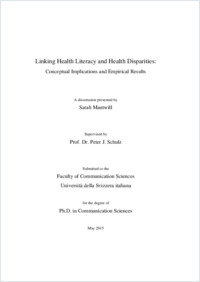Linking health literacy and health disparities : conceptual implications and empirical results
- Sarah, Mantwill
- Schulz, Peter (Degree supervisor)
-
22.06.2015
196 p.
Thèse de doctorat: Università della Svizzera italiana, 2015 (jury note: Summa cum laude)
Health literacy
health disparities
validation
S-TOFHLA
healthcare costs
medication costs
diabetes
health insurance data
health disparities
race/ethnicity
systematic review
social determinants
immigrants
acculturation
language proficiency
English
Health literacy, defined as “(…) the degree to which individuals have the capacity to obtain, process and understand basic health information and services needed to make appropriate health decisions.” (IOM, 2004), has been found to be an important concept in explaining differences in health. Limited health literacy has been linked, amongst others, to worse general health (Wolf, Gazmararian, & Baker, 2005), less usage of preventive healthcare services (Bennett, Chen, Soroui, & White, 2009), higher risk of hospital admissions (Scott, Gazmararian, Williams, & Baker, 2002), and eventually higher mortality (Baker et al., 2007). Particular in groups that are afflicted by socioeconomic disadvantages limited health literacy has been found to be more prevalent, thus lending itself as an important factor to consider when talking about health disparities in general. Research on the concept of health literacy in the last twenty years has largely evolved in the United States (US) and conceptualizations, as well as the development of measurements, have been so far predominantly developed in the US. Only little research has yet focused on its transferability to other contexts to explore whether underlying constructs and relevant measures will show the same patterns. Further, in how far commonly found relationships between health literacy and health outcomes or behaviors will also hold true in other countries than the US. The work presented in this dissertation sets out to test in how far health literacy can be transferred to other contexts and how far patterns found concur with those found in the US. Further, it aims at contributing to the still ongoing debate on the conceptualization and operationalization of health literacy, as well as on the conceptual pathways that link health literacy to differences in health. By providing the results of two studies that aimed at validating a short measure of functional health literacy in two different countries, this dissertation provides evidence on the fact that commonly used measures of health literacy are also valid when used in other contexts. Further, that the concept of health literacy and its underlying constructs are transferable to other parts of the world (Part I). Having established a potential cross-cultural and linguistic validity of the concept of health literacy, two studies are presented that aimed at testing the relationship between health literacy and healthcare costs in a sample of diabetes patients in Switzerland. Thereby, testing whether hypothesized relationships would also hold true in the Swiss context. Further, to contribute to the empirical literature by providing evidence on a still largely understudied relationship in the field of health literacy. Results confirmed hypothesized relationships, showing that lower levels of health literacy indeed were related to higher healthcare costs (Part II). The dissertation also aims at contributing to the current discussion in how far health literacy contributes to differences in health outcomes. In particular those that are often associated with other social determinants that are closely linked to unjust distribution of wealth or education. In the US for example ethnic and racial minorities have been most often found to be afflicted by the negative outcomes of health. Health literacy as a potential explanatory variable in this relationship has been widely discussed, yet little is known about its exact role in this relationship. The dissertation presents a conceptual discussion on the relevant issues that may have prevented health literacy to be more systematically integrated into research on disparities and to not fully leverage its potential for interventions in the field. Further, by means of a systematic review the work at hand aims to outline the current empirical knowledge on health literacy and health disparities. Results of this review indeed point to the fact that little systematic evidence is yet available, due to the lack of systematic testing of potential pathways describing how health literacy contributes to disparities. Further, disparities as such are only seldom sufficiently described in the literature and are predominantly treated as confounders. Lastly, a study is presented that tested for differences in health literacy by comparing three immigrant groups in Switzerland to the general Swiss population, and explored in how far the interplay between health literacy and acculturation might explain health differences. This dissertation contributes to the discussion on the conceptualization and operationalization of health literacy by providing evidence on its transferability and that its underlying constructs might be sufficiently applicable to other contexts. Further, the relationships identified do not only have implications for researchers but for healthcare practitioners and policy makers as well. In particular the relationship found between health literacy and costs has the potential to significantly leverage health literacy as a topic on the healthcare agenda. Finally, by discussing and identifying gaps on current knowledge on how health literacy contributes to disparities, and by identifying differential effects by means of different measures, this work presents a first careful stepping stone on how to systematically disentangle potential pathways linking health literacy to health disparities.
- Language
-
- English
- Classification
- Medicine
- License
-
License undefined
- Identifiers
-
- RERO DOC 257162
- URN urn:nbn:ch:rero-006-114501
- ARK ark:/12658/srd1318717
- Persistent URL
- https://n2t.net/ark:/12658/srd1318717
Statistics
Document views: 380
File downloads:
- Texte intégral: 251
